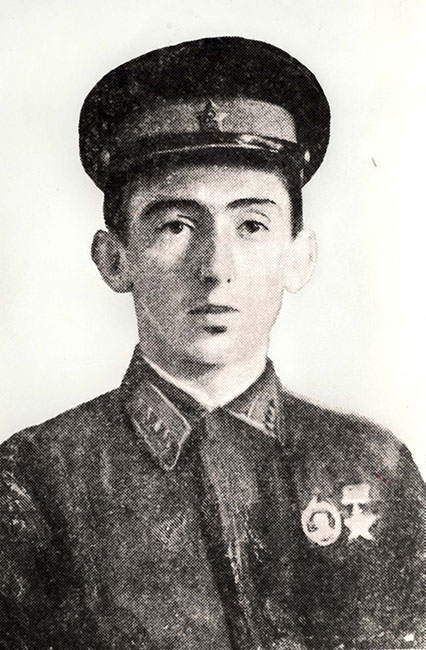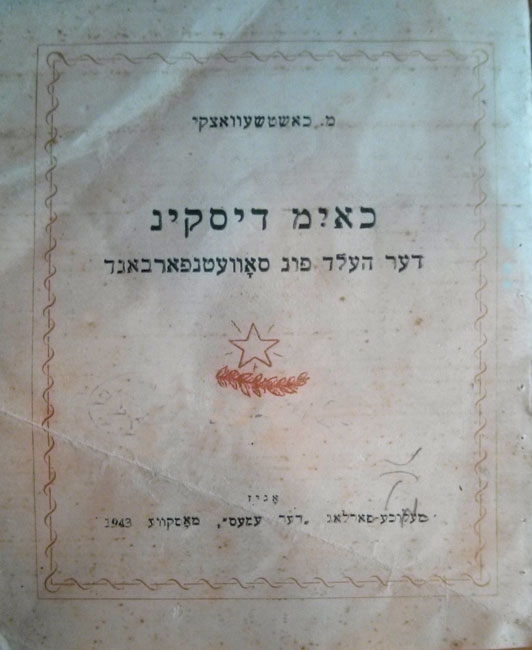Efim (Chaim) Diskin was born on January 1923 into a family of farmers in the village of Kadima in the Dzhankoi Region of the Crimea. Simultaneously with his school studies, he learned to play the violin. He then moved to Kursk, where he graduated from middle school in 1940 and then enrolled at Moscow's Institute of Philosophy, Literature, and History, the most popular Soviet institution of higher education in the humanities.
In July 1941, a month after the German invasion of the USSR, he volunteered to join the Red Army. After completing military school, where he specialized in anti-aircraft artillery, he was assigned to an artillery regiment of the 16th Army, commanded by Konstantin Rokossovskii. In November 1941, in view of the serious threat to Moscow, 37-millimeter artillery weapons were converted into anti-tank weapons and Diskin's regiment was transformed into an anti-tank one.
On November 17, 1941, while his unit was attempting to repulse a tank attack, Diskin's cannons were the last to continue firing. He personally destroyed 4 enemy tanks. Diskin was the sole survivor of his battery, although he suffered from multiple wounds, some quite serious.
It was said that either Marshal Georgii Zhukov or General Konstantin Rokossovskii personally observed this battle from a command point. On April 12, 1942 Efim Diskin was "posthumously" awarded the honor of Hero of the Soviet Union. While he was in the hospital, Diskin heard that he had been awarded this top Soviet military distinction.
On August 25, 1941 Eynikayt, the Yiddish newspaper of the Jewish Anti-fascist Committee published the article "Hero of the Soviet Union Chaim Diskin" by Rakhmiel Fish. The editors sent a copy of the article to Diskin in the hospital. He responding by sending a letter of thanks to the editors, which they published. This letter reflects the feelings of many Soviet Jews. It also somewhat exceeds the usual Soviet ideological framework.
Diskin was in Soviet hospitals until 1944. Then he totally changed profession, entering the Military-Medical Academy, from which he graduated in 1947. Thereafter he engaged in medical research, defending his doctoral dissertation in 1961. From 1967 until his retirement in 1988 Diskin headed the department of normal anatomy at the Military-Medical Academy. In 1981 he was awarded the rank of major-general in the Medical Service. Efim Diskin died in 2012 in St. Petersburg.
Related Resources
Efim (Chaim) Diskin's Memoir
Many years later Efim (Chaim) Diskin wrote in his memoirs about how he learned that he had been awarded the highest Soviet military decoration:
"….Someone showed me the newspaper Pravda, in which was published the April 12, 1942 Decree of the Presidium of the Supreme Soviet of the USSR. Among those so honored were one general, Ivan Vasilievich Panfilov, and one Red Army soldier, Efim Anatolievich Diskin. [According to the newspaper] both received this honor posthumously.
I immediately said that I would not accept any congratulations. After all, I was alive so the award could not be for me. Then, the heads of the hospital sent a telegram to M.I. Kalinin, the Chairman of the Presidium of the Supreme Soviet of the USSR, that included all the details related to me. Soon afterwards an official telegram arrived that stressed that the honor of Hero of the Soviet Union was indeed for me – "the aimer of the 37-millimeter weapons of the 694th Fighter Anti-tank Regiment of the 16th Army, whom he, M. I. Kalinin, warmly congratulates and wishes a complete recovery…."
From: Efim Diskin, Memoirs.
Letter of Efim (Chaim) Diskin to Eynikayt
In a letter Efim (Chaim) Diskin wrote to the editors of Eynikayt on December 5, 1942 he said (it is possible that the letter was later edited before publication).
"… I thank you with all my heart for your cordial and hearty congratulations. I am proud of being aware that I am a son of the great Jewish people, the people that has given to the world such great men as Marx and Heine, Sholem Aleichem and Einstein, Sverdlov and Kaganovich, Spinoza and [I.L.] Peretz. There are no words to express my infinite love for my much-suffering people, for its millennial culture…. Our people is mighty and talented and the fascist monsters will never destroy it or force it to its knees….
Hero of the Soviet Union Efim Diskin
I would be very grateful if you would send the same issue of the newspaper to my parents."
From: GARF 8114-1-1056, copy YVA JM/26328, published as "A briv funem held fun sovetn-farband Khaim Diskin" (The Letter of the Hero of the Soviet Union Khaim Diskin), Eynikayt, December 5, 1942 (in Yiddish).








